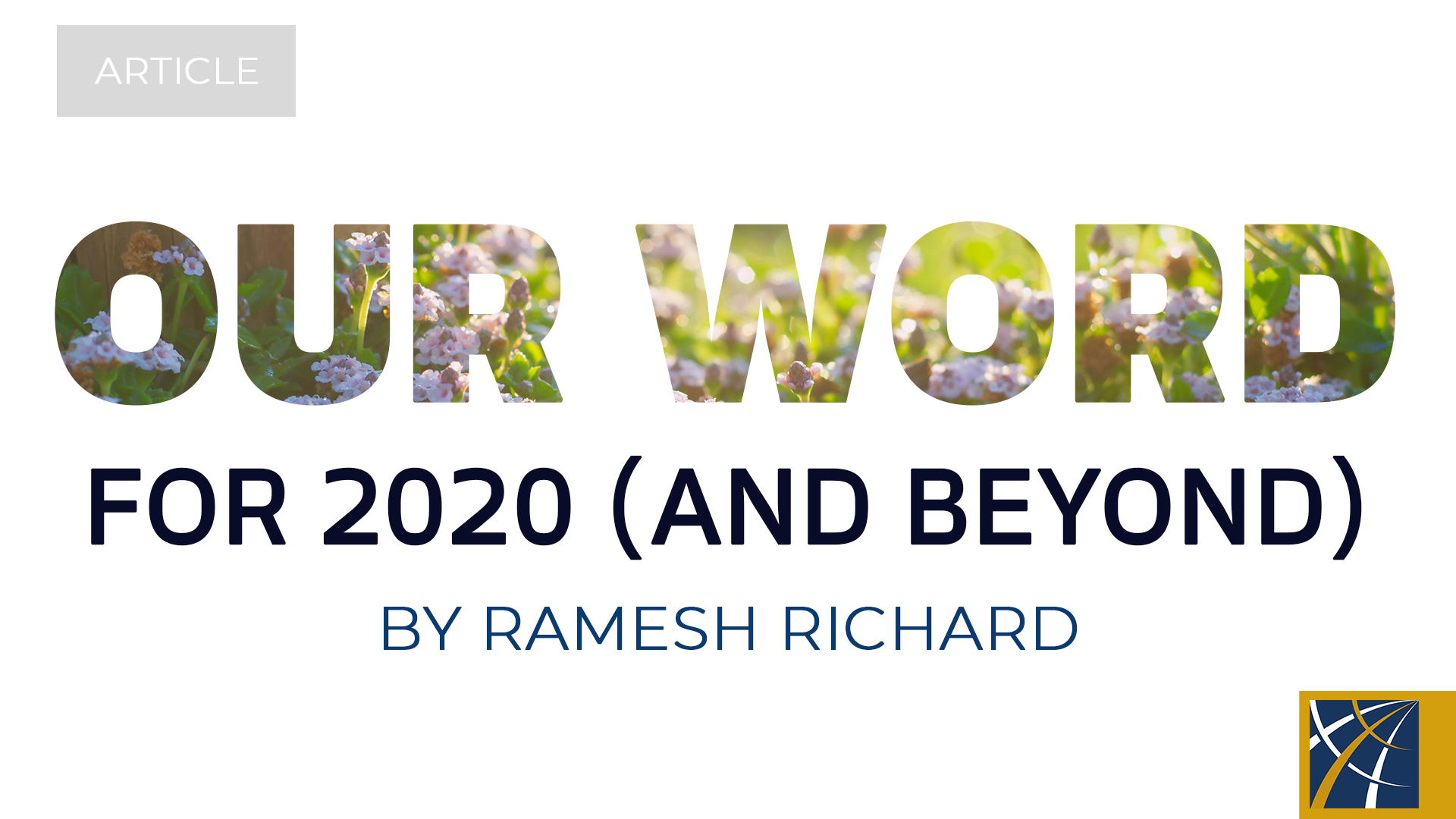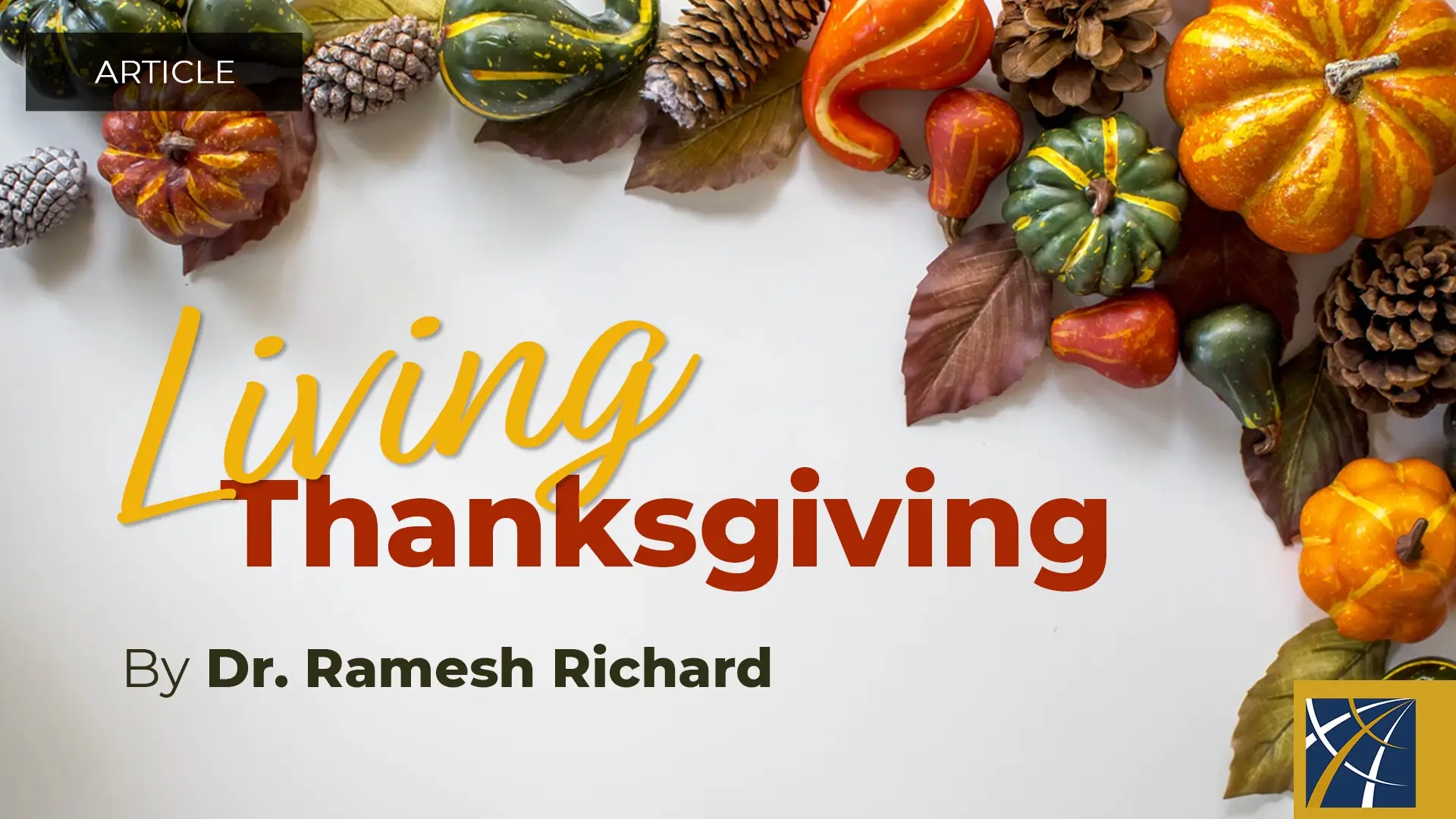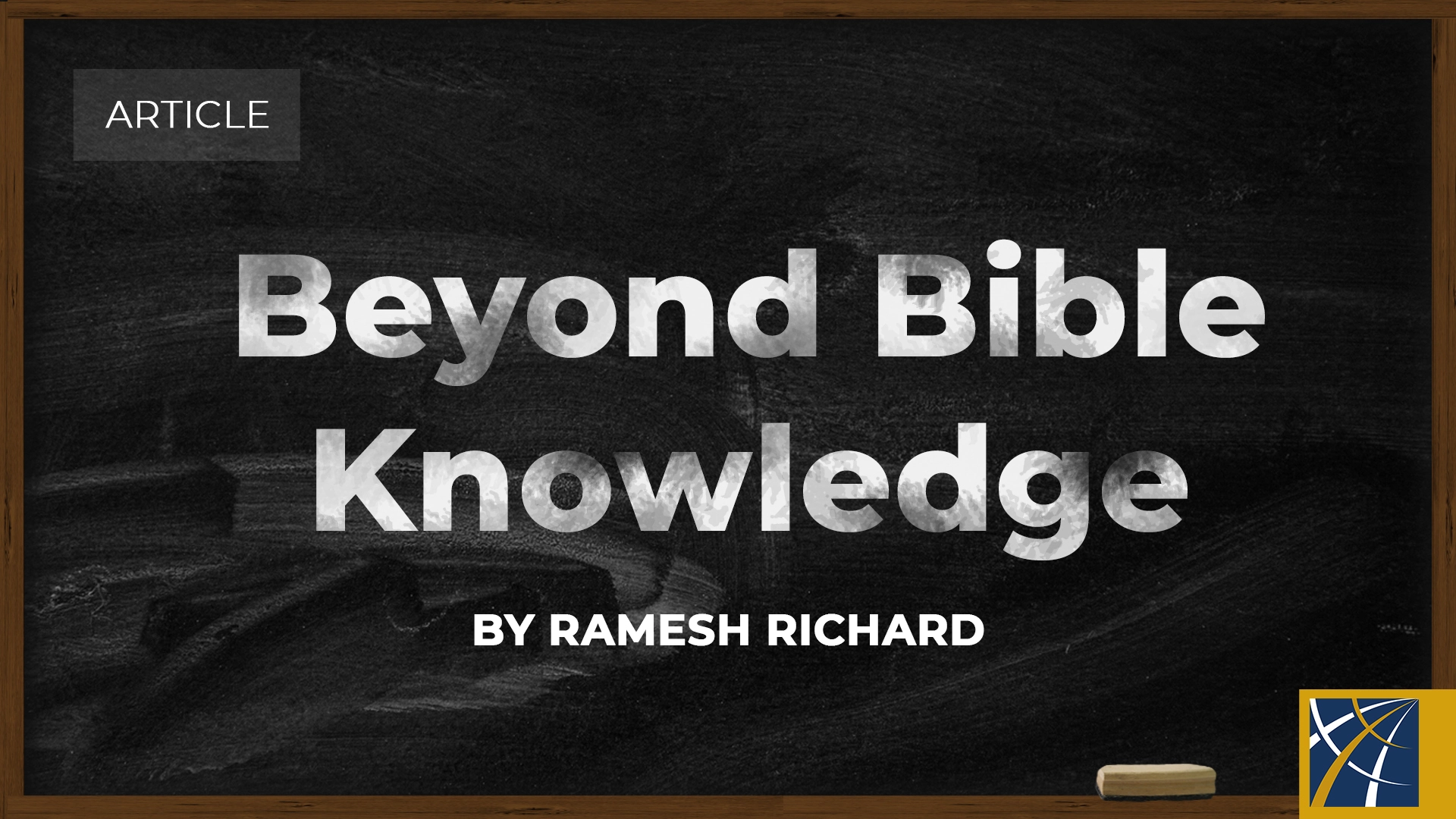(Y)OUR WORD FOR 2020 (AND BEYOND)
by Ramesh Richard
Limits characterize life. Humans experience physical and psychological limitations, geographical and chronological parameters, cultural and intellectual boundaries.
Call it finitude. We may try to maximize this existential reality, and we must. Some even break human limits in indirect ways. Remember when poets thanked God that “men cannot fly”? Now we fly, harnessing mind, metal and nature to transport us across the world and to the moon and back—most often with bags.
Finitude is attended by frailty. All earthly life features a necessary beginning and an inevitable end. Once we cross peak age, which comes all too early (25, I am told), we attempt to deal with the varied limits of body and brain, time and space, thought and energy. And yet death equalizes us, finalizing it all. We will all decline and die.
Beyond general human limits, I experience personal limitations. By inherited or acquired temperament and upbringing, certain limitations uniquely mark me. I often need internal fortitude to carry on in the face of circumstances and demands, successes and failures. My chronology, biology and psychology intersect more than ever before. When I asked my wife, Bonnie, why at times my spiritual confidence is lacking or why I move away from my usual affirming, problem-solving approach, she insightfully and quickly remarked, “Physical exhaustion.” Jet lag takes much longer for me to overcome.
Fred Smith, Sr., (organizational mentor and friend for nearly two decades) distinguished between reality, which simply must be accepted, and problems, which need solutions. Maturity lies in identifying which is which. General and specific limitations are realities to be accepted. But there are ways to accept realities and manage work-arounds without excuse or escape in order to still accomplish responsibilities.
Where may I find resources to achieve God’s will? Where lies the strength to fulfill God’s call in the middle of my finitude and frailty, and sadly, my fallenness and fickleness, too? How can I go from finitude to fortitude while facing the reality of human and personal limits in life and ministry?
Our Word for 2020 (and Beyond)
Enter my word-for-the-year.¹ For the next decade, or for as long as He gives life, breath, health and all the resources I need, I nominate and claim a biblical word.
Before I disclose it, you’ve probably guessed it. You, too, have probably seen the famous Bible verse on church posters, t-shirts and email signatures.
The big reveal: ABLE, our word that can apply for 2020, 2030 and beyond. Philippians 4:13 brims with able: “I can do all things through Him who strengthens me” (NASB). Six words in Greek, 10 in English, and about 1,500 in this article. Never have I explored with you the full meaning of this much-quoted and intuitively appealing verse. I need its personal assurance for my next season of known responsibilities and unknown realities under the Lord’s will.
Good
It’s good to relish this verse’s nuances in a stair-step format in English. How about intentionally setting aside quiet time as a New Year’s exercise to probe each step on the staircase below? For example, at step 2, there’s a “can” rather than a “can’t” or “won’t” approach to life. At step 4, the necessity to do “all things” through Him reveals my innate inabilities.
So with an open Bible and notebook, write out your observations for personal confidence in Christ. Send me a couple of those insights (ramesh@rreach.org) to strengthen my soul into the New Year, the next decade and the rest of my life. I look forward to hearing from you by January 31.
1. I
2. I can
3. I can do all things
4. I can do all things through Him
5. I can do all things through Him who strengthens me.
Better
It’s better to clarify what is off-limits in this verse before we consider its unlimited sense. Let’s study these limitations here briefly. (In a month or so I hope to write a more substantive treatment of this verse loaded with meaning and significance.)
Limitation one: It is not a promise to do all things one wishes. No Christian would take this verse as an excuse to sin. Already then, “some things” you can do Paul leaves out of “all things.” Neither does he claim omnipotence, an attribute of God alone. Paul does not say, “I can do anything.”
Occasionally I conclude my Sabbath rest by watching America’s Funniest Home Videos after the evening news. Annika Joy, our granddaughter, Bonnie and I laugh with the live viewers on the family show. Look up “Chubby Karate Kid—Stick Break Fail” to crack a smile. This optimistic young man declares, “The world may have power, but God has given me a power that is stronger than the world.” Alas, the stick doesn’t yield to God’s power in the young man’s karate chops.
Limitation two: This declaration is not a command to become strong on our own like “the little engine that could.” We don’t have it in ourselves to be strong or live strongly, even though some hate admitting weakness and appear to possess native strength. Before God we are all weak, and in time we shall succumb.
Best
It is best to understand, embrace and implement what this amazing verse really offers us: personal strength from the divine Strengthener for every situation so we can do all He has given us to do. In short, in and with Christ I can do all I should. He makes me able for life in ministry. Or, as I found in an old English paraphrase, “He ableth me.”
The immediate context of this incredible verse’s “all things” shows Paul’s contentment in all ministry circumstances and his endurance through all external conditions. He sometimes does with aplenty in abundance while at other times he goes a-hungry in want (4:11–12). Elsewhere he declares that he endures “all things” for the sake of those who are chosen (2 Tim. 2:10).
Active, not passive, contentment is difficult to accomplish with our acquisitive propensities towards the newest model and the latest fashion. When individuals are forced to endure under constraints for the Faith, as I have encountered all over the world, it takes supernatural strength to be content and endure. Pursue circumstantial contentment through Christ’s strength to notice that we are able to endure through our limitations. Many persecuted Christians today witness to this unexplainable accomplishment. Martyred believers will also someday testify to it.
Could this phrase cover any situation in an unlimited way? Yes, as it relates to the preaching and progress of the Gospel, the planting and care of believers. Paul is able to accomplish what God has given him to do under any circumstance in relation to his ministry responsibilities and stewardship. That is, through Christ’s strength, I am able to be content in, endure through and achieve all things in my limitation, situation and obligation for the progress of the Gospel (e.g., Paul’s prison mission, Phil. 1:13ff).
Christ’s strength is present and continuous rather than sporadic in occasional ways and times. The power of Christ Jesus, who will one day be given a name above every name (2:9–11), is available and accessible to any Christian servant now.
For that which is accessible is available, but that which is available is not necessarily accessible. Implied in this verse are both a mutual relationship established, which gives us the availability of Christ’s strength, and a vital relationship nurtured, which gives us accessibility to Christ’s strength.
As we cherish and cultivate our relationship to Christ, His strength continually empowers us with the ability to be content in and endure through all realities while achieving His purposes. Our personal relationship with Him brings His spiritual resources into our ministry responsibilities. This word-for-word translation clarifies it well: “For all things I am able through the One who strengthens me.”
The Word in Practice
A recent stark experience with inevitable frailty came at a nursing home where Joyce Perry, my mother-in-law, lives. Hale and hearty men and women, who were once at the top of their game as businesspeople and professionals, were now barely mobile. Confined to wheelchairs, neither able to feed themselves nor make meaning in their interactions, they were ebbing away into the twilight of life into death.
I was there because we nearly lost my mother-in-law. Upon moving from hospital to the rehab facility, Joyce clearly announced from her wheelchair, “Ramesh, I know why I am back here at the nursing home. I am here on a mission. To witness to others about Jesus.” Yesterday she was excited to read aloud from her large print Bible to comfort hard-of-hearing Cliff, a fellow-resident.
Wow! My strong-willed loved one, with little earthly life left at 92, ready to die, having spent her physical strength, still finds inner strength through her live spiritual connection with her Strengthener. She accesses available divine strength to be able to make it through each day as a witness. I applaud her.
Physical and circumstantial limits are a reality. A vital relationship with Christ gives me the work-around ability to fulfill my life for Christ. Simply speaking, He is able, therefore I am; I am able because He is.
One helpful tactic I use (you can, too) is setting my phone alarm for 4:13 p.m. every day. My screen lights up to remind me of able! In contentment and with endurance, I can face human finitude with Christ’s fortitude to achieve all His/my work. Join me in making able, a word with receptor and actor dimensions, our powerful, true and lovely word for the upcoming year and beyond.
_______________________
¹ This personal and organizational practice each New Year provides focus and inspiration. We have chosen from several word forms: a preposition in 2019, through, to show instrumentality; a participle in 2018, balancing, to align the organization; a verb in 2017, deliver, to inspire activity, etc. This year, I submit a suffix-able adjective!






